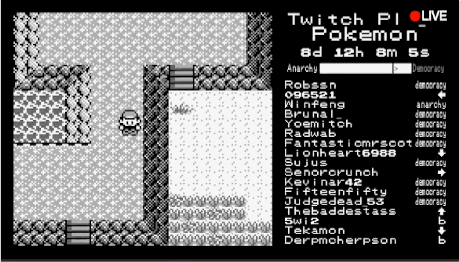Difference between revisions of "Pokemon"
Auxiliatrix (Talk | contribs) (Created page with "File:Twitch.gif Patrick Jagoda referenced the 2014 effort of ''Twitch Plays Pokemon'' in his essay on [http://www.zachblas.info/wp-content/uploads/2016/04/jagoda_network-...") |
Auxiliatrix (Talk | contribs) |
||
| Line 1: | Line 1: | ||
| − | [[File:Twitch.gif]] | + | [[File:Twitch.gif|right|Twitch Plays Pokemon in its typical kind of progress]] |
Patrick Jagoda referenced the 2014 effort of ''Twitch Plays Pokemon'' in his essay on [http://www.zachblas.info/wp-content/uploads/2016/04/jagoda_network-ambivalence_contemporaneity_2015.pdf Network Ambivalence]. He describes as a way to "defamiliarize human behavior." That's an interesting way of looking at the game -- one I had not considered before. | Patrick Jagoda referenced the 2014 effort of ''Twitch Plays Pokemon'' in his essay on [http://www.zachblas.info/wp-content/uploads/2016/04/jagoda_network-ambivalence_contemporaneity_2015.pdf Network Ambivalence]. He describes as a way to "defamiliarize human behavior." That's an interesting way of looking at the game -- one I had not considered before. | ||
Revision as of 22:57, 27 November 2017
Patrick Jagoda referenced the 2014 effort of Twitch Plays Pokemon in his essay on Network Ambivalence. He describes as a way to "defamiliarize human behavior." That's an interesting way of looking at the game -- one I had not considered before.
Users of Twitch collectively played a game of Pokemon together. At its height of popularity, some 100,000+ players were inputting commands at the same time, trying to get the player character to obey their individual whims. This created a kind of hive mind, similar to an insect colony. At first, the character would only respond to the first commands inputted, but due to the chaotic nature of many players inputting commands at the same time, a system of choice was implemented. Democracy allowed for players to vote on how to move next, often making it easier to solve puzzles, while anarchy used the same almost-random command input as before. It took a couple of weeks, but somehow, they managed to beat the game and defeat the Elite 4.
What was interesting about TPP is how much of a network formed around the single game. They created their own mythos based off events in the game, such as labeling a Flareon they received as a False Prophet, and making their Pidgeot into a Messianic character. It created a community out of literally nothing. It even became an artistic argument in its own merit. TPP is a great example of the kinds of network that can develop through digital media.
